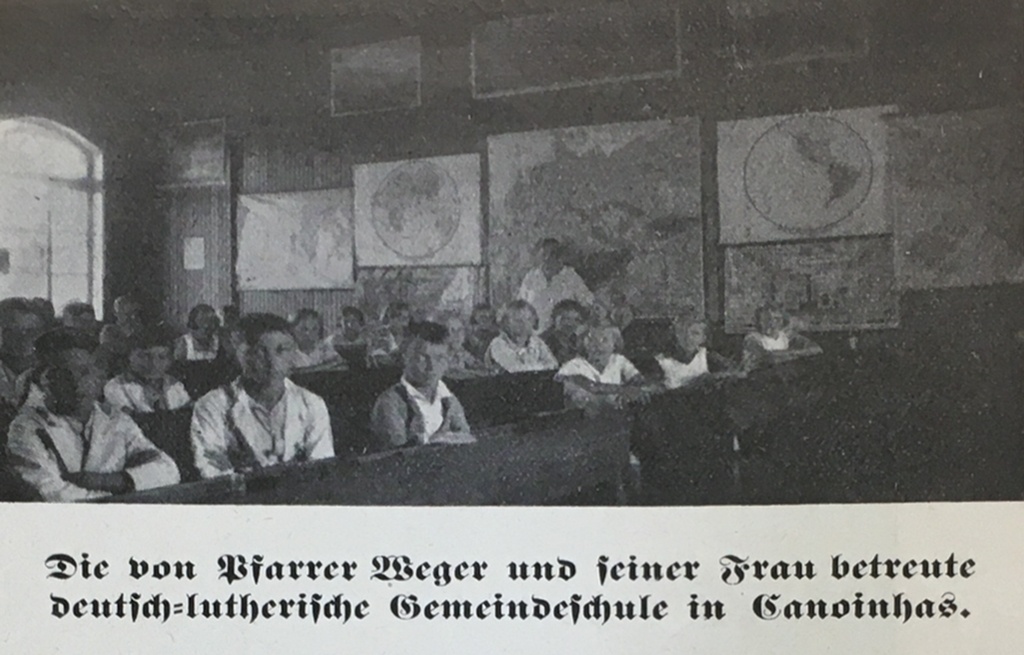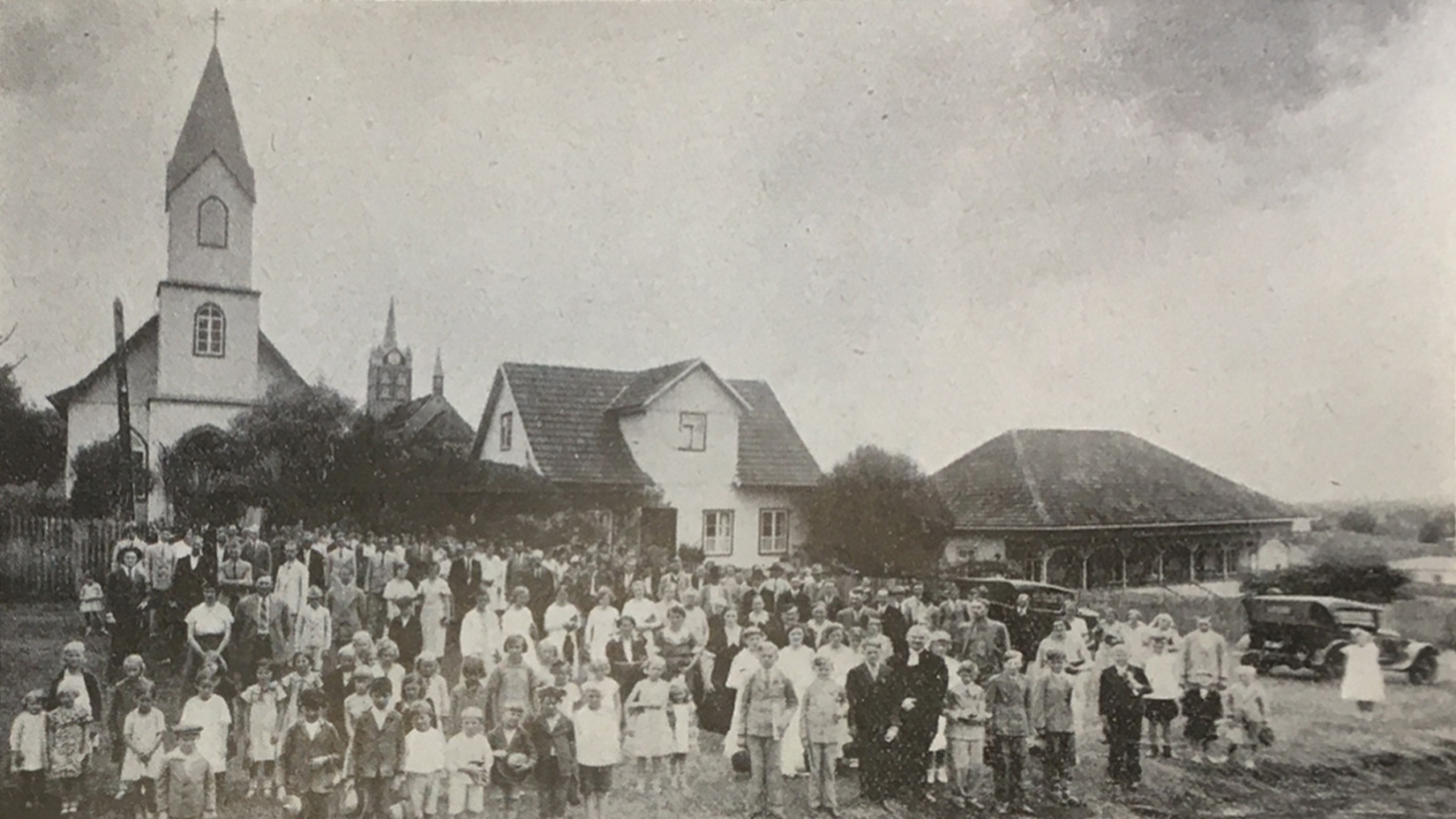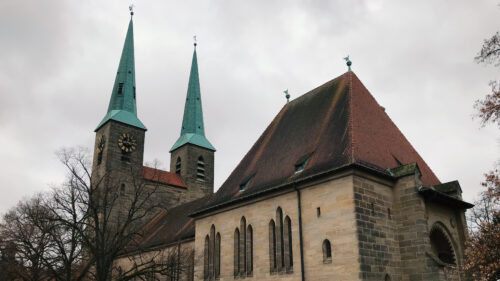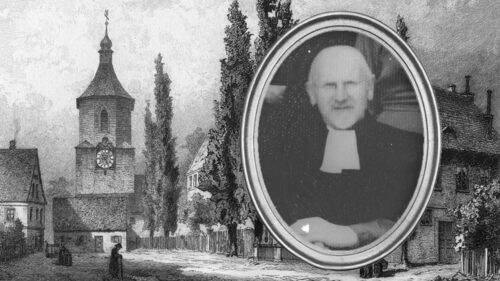The beginnings of German immigration to Brazil date back almost 200 years. Since 1824 more and more Germans have been settling in ethnically uniform settlements that were to become a refuge for Nazi criminals after World War II. German language, German customs, German ‘faith’ – mixing with the people of Brazil is no option for them.1
In Lutheran combat manner, Protestant-Lutheran fortresses against ‘dangerous’ foreign influence are hastily erected. The German theologian and Brazil-pastor Wilhelm Rotermund makes the fusion of Germanity and Lutheranism in Brazil unmistakably clear:
He who ceases to feel and think in a Protestant way, also ceases to be German; and vice versa: he who denies German language and German nature, will also be lost to our [Lutheran] church. Church and Germanity are conjoined for life and death.
German theologian and Lutheran pastor in Brazil, Wilhelm Rotermund, 1936
In: Dreher, Martin: Kirche und Deutschtum in der Entwicklung der evangelischen Kirche Lutherischen Bekenntnisses in Brasilien, 1978, p.84
The Lutheran church schools serve as an instrument to permeate society with the Germanic spirit. It is the precondition of their own Lutheran existence – in life and in death both are connected with each other. At the same time they are guarantors who breed Germanity in its purest form.

For our work in Brazil two things belong together: German and Lutheran – and church and school. The cultivation of ethnicity is important for the preservation of our church and vice versa. […] In Brazil, ethnicity is lost where church and school do not take care of it.
“Deutsche in Brasilienl” by Pastor F. Schlünzen 1936, p. 18
The state ideologies of being a member of the master race, the superiority of the Aryan race and maintaining the purity of German blood find their religious counterpart in maintaining the purity of the Lutheran teaching. The merging extremes are characterized by the delusion of an encroaching supremacy in which one’s own existence is only imaginable through the radical exclusion and destruction of others.
While biological blood purity hardly seems to be able to reach consensus today, the ideological foundation of the Lutheran identity in the spirit of a religious ideology of being a member of the master race, remains unabated to this day. This identity is manifested in an attitude of contempt, hatred, arrogance and envy. To this day, it characterizes an activism that aims at damaging and destroying other faiths.
1934
In this more or less coexistence of Germans and Brazilians, the fundamental contrast is slightly apparent. Probably most obvious at dance festivals. The Brazilian believes he has a right to girls of German descent, all the more he knows that he is not liked, even detested, because of racial feeling and his lack of moral character.
[…] On part of the inferior people [the Brazilians] this feeling sometimes makes itself heard in open hostilities, but for the time being one need not be too concerned about rape.
[…] Within 20 years, they [the Germans] have established flourishing colonies where otherwise only black lowlifes lived.
Brazil-pastor Gotthard Grottke, In: Freimund, 1934
2017
In the worst case, those Charismatics brainwash their followers and take as much money from them as possible. Wealth is perceived as a sign of the love of God. The views are highly conservative: against alcohol, sex before marriage, abortion, homosexuality, and often against other religions […]. That’s why it is clear that the Protestant church wants to dissociate itself from this humbug and emphasizes its origin which is Martin Luther.
Kirche in Brasilien: Was heißt hier evangelisch? In: Sonntagsblatt”, 360° Evangelisch, 2017
It is almost unimaginable how the hatred of German Lutheranism against different charismatic movements manifests itself to this day!
1 Borchert, Hermann: „While Germans in North America quickly amalgamate with the Anglo-Saxon race, the German nationality has kept itself unmixed for forty years. Considering the dissimilarity between the German and the Portuguese character, it will continue to remain unmixed.” In: Dreher, Martin Norberto: Kirche und Deutschtum in der Entwicklung der evangelischen Kirche Lutherischen Bekenntnisses in Brasilien, 1978, p. 71
Picture credits:
Cover picture: Freimund, photo insert on the occasion of the annual celebration of the Martin Luther Association in Bavaria, 1934. Title: “So pflegt das Brasilianische Hilfswerk des Martin Lutherbundes lutherisches Kirchentum und deutsches Volkstum durch Sendboten vor allem des Neuendettelsauer Missions- und Diasporaseminars [Pfarrer Georg Weger].


